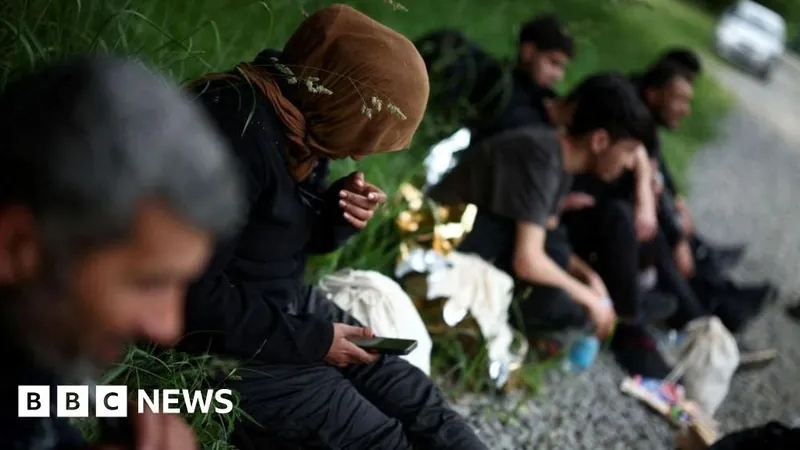
Poland's Drastic Asylum Suspension: A Controversial New Migration Strategy
2024-10-12
Author: Ling
Poland's Drastic Asylum Suspension: A Controversial New Migration Strategy
In a shocking announcement, Polish Prime Minister Donald Tusk revealed plans to temporarily suspend the right to asylum as part of a newly proposed migration strategy aimed at tackling irregular migration. Speaking at a meeting of his Civic Coalition in Warsaw, Tusk accused people smugglers, allegedly backed by Belarus and Russia, of exploiting the asylum system to flood Europe with migrants.
Since 2021, Poland has seen an unprecedented surge in illegal crossings, primarily from individuals hailing from the Middle East, Africa, and Asia via Belarus. The Polish government has labeled this influx as part of a 'hybrid warfare' campaign orchestrated by its eastern neighbors to create chaos within the European Union. Both Belarus and Russia have staunchly denied these allegations.
The crisis escalated dramatically in August 2021, with a staggering eightfold increase in attempted border crossings compared to the entirety of 2020. Daily attempts continue, putting immense strain on Poland's border control and immigration system.
Tusk is set to unveil the full details of his migration policy in a government meeting scheduled for October 15. He stated, 'One of the elements of the migration strategy will be the temporary territorial suspension of the right to asylum. I will demand this and seek recognition for this decision across Europe.' However, the lack of clarity regarding how he plans to justify this move to his EU counterparts raises significant concerns.
International law mandates that countries must provide the right to claim asylum, leaving many human rights advocates questioning Tusk's approach. He expressed frustrations regarding how this right has been manipulated, stating, 'We know very well how it is used by Lukashenko, Putin, and human traffickers, working against the very essence of the right to asylum.' Tusk emphasized the need for Poland to regain full control over its borders.
Many migrants crossing into Poland from Belarus do not remain in the country but instead continue their journey to neighboring Germany, prompting Berlin to increase border checks. In a surprising move, Tusk's pro-EU coalition is upholding the hardline migration measures initiated by the previous right-wing Law and Justice government, which included creating pushbacks and erecting a formidable 5.5-meter-high steel fence along 186 kilometers of the border.
While the Law and Justice government adopted a stern stance against migrants from the Middle East and Asia, it paradoxically issued the highest number of residence and work permits in the EU during its tenure. Tusk's administration is maintaining this tough posture, reintroducing exclusion zones and recently legislating the decriminalization of firearms usage by security forces in self-defense following a tragic incident involving a soldier's death caused by a stabbing at the border.
Public sentiment appears to favor these stringent policies, with recent polls indicating that a staggering 86% of respondents support the authorization for border security to use weapons in self-defense. Foreign Minister Radoslaw Sikorski emphasized that the Civic Coalition's tough migration stance was pivotal in their electoral success last year, suggesting that had they not adopted this position, they may not have secured victory.
However, human rights organizations express alarm over the ramifications this policy could have, particularly as an estimated 130 migrants have lost their lives along the borders of Belarus, Poland, Lithuania, and Latvia since the crisis began. Malgorzata Szuleka from the Helsinki Foundation for Human Rights criticized Tusk, stating, 'This is a new low.' As the humanitarian crisis unfolds, calls for rational discourse over populist-driven policies are growing ever more urgent.
As Europe grapples with an escalating migration crisis, all eyes will be on Poland's next moves—and how they could influence the broader European response to migration and asylum. Will this drastic measure help stabilize the borders, or could it ignite further humanitarian challenges? Only time will tell.




 Brasil (PT)
Brasil (PT)
 Canada (EN)
Canada (EN)
 Chile (ES)
Chile (ES)
 España (ES)
España (ES)
 France (FR)
France (FR)
 Hong Kong (EN)
Hong Kong (EN)
 Italia (IT)
Italia (IT)
 日本 (JA)
日本 (JA)
 Magyarország (HU)
Magyarország (HU)
 Norge (NO)
Norge (NO)
 Polska (PL)
Polska (PL)
 Schweiz (DE)
Schweiz (DE)
 Singapore (EN)
Singapore (EN)
 Sverige (SV)
Sverige (SV)
 Suomi (FI)
Suomi (FI)
 Türkiye (TR)
Türkiye (TR)